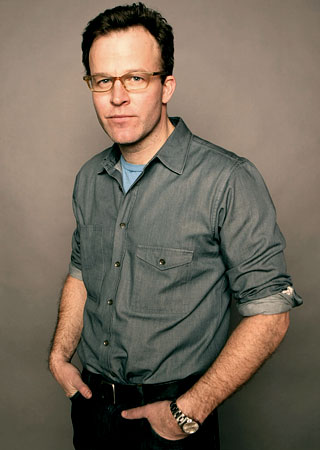
In this edition of The Film Round-Up: Did you know that one of the year's best films was written by the guy who penned friggin' Wolverine? Did you know that I saw three films over three days involving literary titans (Tolstoy, Williams, and Darwin) all of them were subpar?
Seriously, the guy behind that odd combo, David Benioff, knows what he's doing. His collection of short stories, When the Nines Roll Over, is very good. And he's married to Amanda Peet, giving hope to scruffy scribes worldwide. I tip my cap to you, good sir.
As always, these reviews previously appeared in ICON and are reprinted with permission (thanks, Trina).
Creation (Dir: Jon Amiel). Starring: Paul Bettany, Jennifer Connelly, Toby Jones, Jeremy Northam, Martha West. Charles Darwin's attempt to write On the Origin of Species did not evolve smoothly. Years of research were derailed by the death of his oldest child (West), which turned him into a ghostly recluse with writer's block. That, coupled with pressure from associates to publish and his struggles to align his scientific mind with the concept of God, made for an especially trying period for Darwin, his wife (Connelly), and his surviving children. As Darwin, the usually terrific Bettany is handcuffed by a talky screenplay that skips story development and insight in favor of the following: Darwin suffers a traumatic vision of his late daughter; cue flashback to happier/sadder time; finish with Darwin writhing in emotional anguish. Repeat until audience is borderline comatose. Jones (Frost/Nixon) is excellent in a small supporting role, while the talented Connelly (Bettany's real-life wife) and Northam are given little to do. Only the story's informative bent and the good cast saves the movie from being a complete waste of time. ** [PG-13]
The Loss of a Teardrop Diamond (Dir: Jodie Markell). Starring: Bryce Dallas Howard, Chris Evans, Ellen Burstyn, Ann-Margret, Mamie Gummer, Will Patton, Jessica Collins. A flamboyant, well-traveled socialite (Howard) returns home to Memphis in the 1920s hoping to overcome her past and make a splash in the debutante scene. Without a suitable companion, she buys one: a handsome, but troubled laborer (Evans) burdened with problems he can't solve. A mutually beneficial arrangement becomes extremely complicated when she develops feelings for him. Based on a "recently rediscovered" screenplay by Tennessee Williams, perhaps this is one the studios should have overlooked. Of the film's many faults—poorly defined characters, a plot that caroms here and there like a pinball, Evans' limp performance and Howard's unsympathetic one—there's a shocking lack of urgency. We never feel that anything is on the line, that the characters are risking anything. Also, the movie has no true identity, instead trying on a bunch (e.g., coming-of-age story, satire on old South snobbery, examination of class values) in a desperate attempt to stir up interest. None take, resulting in a beautifully filmed, lavishly costumed drag. * [PG-13]
The Last Station (Dir: Michael Hoffman). Starring: Helen Mirren, Christopher Plummer, James McAvoy, Paul Giamatti, Kerry Condon, Anne-Marie Duff. In 1910, Leo Tolstoy (Plummer, with a kick-ass beard) is so revered in his native Russia that people live by his philosophies—which became known as Tolstoyism. This is not good for Tolstoy's long-suffering wife (Mirren), who believes that the public prostituting of her husband by his trusted advisor (Giamatti) will destroy her family's financial security. Stuck in the middle is Tolstoy's new assistant (McAvoy), who is also battling growing feelings for an adorable, feisty Tolstoyist (Condon). The good news: The cast (as you might expect) is good and the story is full of gossipy intrigue. The bad news: Writer/director Hoffman can't get a handle on the material and its multiple parts, so the focus is jittery; dramatic tension is minimal. The Last Station feels like watching segments from three very good movies that were spliced together. Yes, there are impressive aspects and you get a taste for what Hoffman wanted to do, but the final product is unsatisfying. ** [R]
Brothers (Dir: Jim Sheridan). Starring: Tobey Maguire, Jake Gyllenhaal, Natalie Portman, Sam Shepard, Mare Winningham, Bailee Madison, Taylor Geare, Clifton Collins Jr., Carey Mulligan. When a young, clean-cut Marine (Maguire) is presumed dead in Afghanistan, his ex-con brother (Gyllenhaal) looks after his nieces and his sister-in-law (Portman). A promising arrangement turns frightening when Maguire, burdened with an awful secret, returns home and becomes convinced that Gyllenhaal and Portman have slept together. Sheridan's unobtrusive direction and David Benioff's show-don't-tell script are perfect for the tension-packed story, allowing a great cast room to work. Maguire (in his best role in years) is outstanding as the tortured veteran, relying more on stoic intensity and a blank stare than any screenwriting device, while Madison is terrific as his slighted and terrified older daughter. This is a moody, deeply felt character study that knows that good drama doesn't mean being dramatic. Only quibbles: The pointless narration, and Portman's immaculate good looks are distracting for someone playing a housewife in crisis. Based on the 2004 Swedish film, Brødre. **** [R]





